Recently, LEDECO Centre Swiss (LEDECO), in collaboration with the University of International Business and Economic (UIBE) of China, have successfully organized an online course on WTO Trade Negotiation Simulation for international graduate students of WTO Law and Economics of UIBE.
From 9th May-12th May 2023, Prof. Xiankun Lu, Managing Director of LEDECO organized a simulation of WTO General Council, in which 10 students participated, as the the last part of the course, after 5 online lectures delivered by Said EL Hachimi, Counsellor, Information and External Relations Division at the WTO; Patrick LOW, former Chief Economist of WTO; Wayne McCook, former Ambassador of Jamaica to the WTO; Stefania Bernabe, Counsellor of Council and TNC Division at the WTO; and Taufiqur Rahman, Head of Unit, Development Division at the WTO respectively, on WTO reform, WTO negotiation and decision-making mechanism, special and differential treatment, etc.
In the simulation of WTO General Council, students were divided into 8 groups, representing the Chair and Secretariat of the WTO General Council, and members including China, the United States, the European Union, Brazil, Switzerland, Jamaica and SVEs, Chad and LDCs, to conduct simulated negotiations on related topics.
During these days, the participating students learned about the terms and rules of the WTO General Council, the division of work and collaboration among delegations, research on negotiation topics, drafting of ambassadorial statements, submission of negotiation proposals, debate on topics under regular sessions, negotiation of texts under special session, revision of negotiation texts, formation of negotiation outcomes, and procedures for signing agreements.
After the simulation, the participating students gave positive feedback about the course.
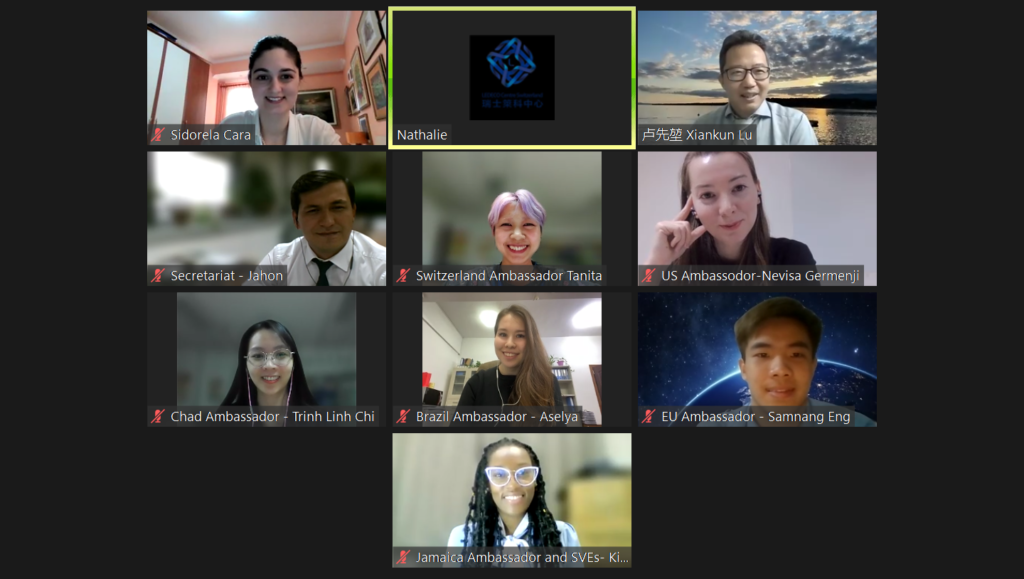
Annex 1: Speech drafted by selected students (simulating Ambassadors from the European Union, the United States, and Switzerland)
- Statement by EU Ambassador
Agenda 3: Developing Countries status and “special and differential treatment” – China
First of all, on behalf of the EU, I would like to express appreciation to all ambassadors that are present in this session today. The EU fully supports the statements provided by the Chad Ambassador that developing countries should be allowed and encouraged to be given the assistance and flexibilities they need to meet their development goals. Nevertheless, change is needed in the organization regarding how flexibilities are crafted and implemented with a view to ensuring that flexibilities are made available to those Members who actually need them. Thus, we fully support the statement by the Brazil and the US Ambassador on the development of China that given its current economic situation, China should not further claim the status of developing country any longer. In order to advance this debate, the EU propose the following points:
(a) Graduation: Members should be actively encouraged to “graduate” and opt-out of SDT, whether horizontally or agreement by agreement. In the interim, Members should be encouraged to clarify in which areas they actually use existing flexibilities and to present roadmaps detailing when they would expect to be able to assume all the obligations stemming from the WTO agreement. This could form an integral part of a Member’s TPR process.
(b) Special and Differential Treatment (SDT) in future agreements: while acknowledging the need for particularly flexible treatment of LDCs, flexibilities available to other Members should move away from open-ended block exemptions toward a needs-driven and evidence-based approach that will ensure that SDT will be as targeted as possible.
(c) Additional SDT in existing agreements: Though existing SDT provisions in current agreements should not be contested, when Members request additional SDT this should be done only on the basis of a case-by-case analysis, on the basis of:
-a clear identification of the development objective that is being affected by the rule in question;
-an economic analysis of the impact of the rule and of the expected benefits of its relaxation;
-an analysis of the impact of the requested flexibility on other WTO Members;
-a specification of the time period for which flexibility is requested and of its scope of application (one Member, a group of Members or all developing country Members).
-Depending on the outcome of this analysis, various approaches can be used to consider additional flexibilities.
- Statements delivered by Ambassador Tanita Rojjanakajorn at the General Council Meeting
May 11, 2023 WTO General Council Meeting, 9 – 12 May, 2023
Agenda 3: Developing country status and “special and differential treatment” – China
Thank you, Madam Chair.
To begin with, Switzerland would like to thank China Ambassador for bringing this important issue into light and also would like to thank China for the strong support in capacity building and technical assistance for developing and LDCs countries. Switzerland strongly agrees with Brazil Ambassador that Free trade under multilateral system is one of the important tools that would accelerate and help developing countries and LDCs to build up their economic capacities in order to reach their development goals. For that reason, we want to reaffirm the importance of the efforts put into SDT design in order to ensure that developing country and the LDCs could secure development growth along slide having their interests and needs at the centre of the work for trade and development spotlight. When the majority of WTO members are part of the developing countries members, in order to ensure that international trade and ways to make trade more sustainable to all with multilateral system at its core are accessible to all, SDT is a crucial tool to allows greater contributions from all members to participate in international trade.
For Switzerland, the pillar of our foreign policy of supporting the integration of developing countries into the global economy always remains to be an objective of Switzerland’s foreign economic strategy. Reviewing and considering the issue of development under SDT as a priority for developing members has always been what the WTO is about. However, in today’s situation, we can see polarised views on the definition and classification of countries as either “developed” or “developing” also of which members should enjoy the special treatment that comes with the developing status. This brings up a bigger challenge for all to find a common ground for members to negotiated to seek the balance of rights that members could exercise and obligations that binds them.
In this sense, we would first like to thank you US ambassador for bringing up a very active clear propose on the issue of developing country status and the SDT. Switzerland agreed with points that the US ambassador has made that there is an urgent need to revisit and discuss upon the issue of having SDT operational model being clearly defined. However, Switzerland is not fully convinced that the US proposal on the use of eligibility requirements is efficient for all. The focus of SDT should not be on more exclusion. It should be on more inclusion. We agree with Chad Ambassador in the sense that the WTO’s approach to SDT must be framed through the lens of this broader view of what development means in which cannot be limited to only one single sets of criteria. It is partly for this reason that considering the varied aspects and stages of a country’s development would help determine the level and type of SDT required to help it achieve sustainable development. Each members will need different aspect of assistance. In short, a binary approach of countries as either “developed” or “developing” is insufficient and unrealistic. Absolutely, it has to be said that this viewpoint is with the exception of LDCs for which criteria are well defined.
The alternative approach to the issue when we are currently in a situation where the world economy is vastly more complicated than what a binary approach could represented. There is now a need for making more nuanced distinctions on trade, case by case, sector by sector. To elaborate, I would like to refers to the Trade Facilitation Agreement (TFA) in 2013 and also the communication document from Norway; Canada; Hong Kong, China; Iceland; Mexico; New Zealand; Singapore and Switzerland under issue of pursuing the development dimension in WTO rule-making efforts in 2019, we can see the elements of this so-called case by case approach that allows developing members to choose their own paths and pace toward implementing the obligations under TFA. Another point that shows the efficiency of this approach is how in the TFA there were different implementation timelines in which within those time and provision, members require technical assistance in order to smoothly implement. There is an element of identifying the need of the members to implement not an opt-out on certain commitments. To this end, Switzerland sees an opportunity and possibility for this approach to help respond to the development needs of members.
To confirm Switzerland’s position on SDT with LDCS, we strongly believe that the general provision of SDT to LDCs should continue. LDC status is already determined by economic criteria, including a clear metric for graduation. We acknowledge and firmly support the notion that the trading system should place much more emphasis on helping LDCs escape economic difficulties situation and provide space for them to addressed current need in which are what SDT exists for with measures such as technical assistance and capacity building.
To sum up, Switzerland firmly supports in implementing our shared commitment to S&D in a more flexible and effective way can help to make the most of these contributions, facilitating the greater integration of both LDCs and developing Members into the multilateral trading system.
Thank you.
- Statement delivered by Ambassador Nevisa Germenji WTO General Council Meeting, Geneva, May 10, 2023
Self-declared Development Status of the WTO Members
Thank you Madam Chair for giving me the floor to discuss about the issue of self-declared development status of the WTO Members. I will start by showing how the world and country members have developed from the beginning of the WTO to this day and then come up with a proposal.
In the preamble to the Marrakesh Agreement Establishing the World Trade Organization, the Parties recognized that “their relations in the field of trade and economic endeavor should be conducted with a view to raising standards of living, ensuring full employment and a large and steadily growing volume of real income and effective demand, and expanding the production of and trade in goods and services, while allowing for the optimal use of the world’s resources in accordance with the objective of sustainable development.
Since the WTO’s inception in 1995, Members have made significant efforts in pursuing these aims. The number of people living in extreme poverty has decreased and trade appears to have been an important contributor.
Despite the great development made in the years since the WTO was established, the WTO remains stuck in a simple and outdated division of developed and developing countries.
Again,
The preamble to the Marrakesh Agreement Establishing the World Trade Organization recognizes there are “needs and concerns at different levels of economic development,” implying there could be many levels of development.
Although the countries members should be committed the “rules-based multilateral trading system”, in reality all rules apply to a few (the developed countries) and just some of the rules apply to most, the self-declared developing countries.
This construct has damaged the negotiating arm of the WTO by making every negotiation a negotiation about setting high standards for a few, and allowing vast flexibilities or exemptions for the many. These are not “reciprocal and mutually advantageous arrangements directed to the substantial reduction of tariffs and other barriers to trade and to the elimination of discriminatory treatment in international trade relations.” (what was accepted in the Marrakesh Agreement)
Other international organizations have recognized that in order to properly carry out their functions, they must make distinctions among what have traditionally been considered “developing country” members. If not, then those that really need special and differential treatment (S&D) the most are put in a disadvantage.
Allow me to briefly mention some indicators to show how the countries have developed since the establishment of the WTO or since their accession to WTO.
- Human Development Index
Reports show that the progress in human development since 1990 had been impressive. The extreme poverty has decreased, and the number of people that had gained access to improved sanitation and source of drinking water has increased. Among countries that have made such significant development are China, India, Colombia, Thailand and Turkey.
- Macroeconomic indicators
Such as GDP and GNI (gross national income) also show that countries like China and India (who are self-declared developing countries) have tremendously increased in the last 20 years.
- Trade and Total exports
Trade data also points to increased differentiation among WTO self-declared developing country. After accession to WTO, China has become one of the largest global exporters of goods. Also, China, India, and Viet Nam registered significant increases in exports by value and volume in the last 20 years.
- High technology trade
After 1995, a new set of Members broke into the top ranks of exporters of high- and medium- technology products. Countries such as Viet Nam; China; Costa Rica; Turkey; South Africa; Colombia; Argentina; India; and Thailand significantly increased their share of high- and medium-technology exports as a share of manufacturing exports. Meanwhile, the shares of several Western countries stagnated or declined. Export data for goods classified as advanced technology products (ATP) provide striking examples of China’s emergence as an exporting powerhouse of high-technology goods, including its outright dominance in several categories.
- Foreign Direct investment
After the accession to the WTO, China’ fdi has been highly increasing and has surpassed countries like Australia, France and Russia, UK and Germany. Today, China is the third country in the world as a top destination for FDI.
In this situation, the US calls for a proposal to establish objective criteria for determining whether a WTO Member may continue to avail itself of “special and differential treatment” (S&D) in current and future WTO negotiations.
The four criteria are:
- A WTO Member that is a Member of the OECD, or a WTO Member that has begun the accession process to the OECD;
- A WTO Member that is a member of the G20;
- A WTO Member that is designated as a “high income” country by the World Bank; or
- A WTO Member that accounts for no less than 0.5 percent of global merchandise trade.
We are trying to engage Members who would meet at least one of the four criteria in the U.S. proposal. We are also engaging other Members—especially LDCs—who would benefit if the more advanced, wealthy, and influential economies among us finally accept responsibilities related to with their role in the global economy.
This proposal from US is NOT just about 1 member. Our concerns go far beyond just one Member. There are a large number of relatively wealthy, advanced, and/or influential economies who would seek to avail themselves of S&D in current and future WTO negotiations.
At the same time, this proposal is not for preventing trade preferences to LDCs. US fully agrees that special and differential treatment should be a part of current and future negotiations, to Members having difficulty integrating into the global trading system. But we have to stress out that there is a group of self-declared developing country Members that are relatively advanced, wealthy and influential and that should not have access to blanket special and differential treatment in current and future WTO negotiations.
These Members do not need access to blanket special and differential treatment provisions because they can and do negotiate flexibilities, they judge necessary to defend their interests.
Annex 2: Video of the speech made by the student simulating Ambassador of Jamaica
Annex 3: Feedback from some students on the course
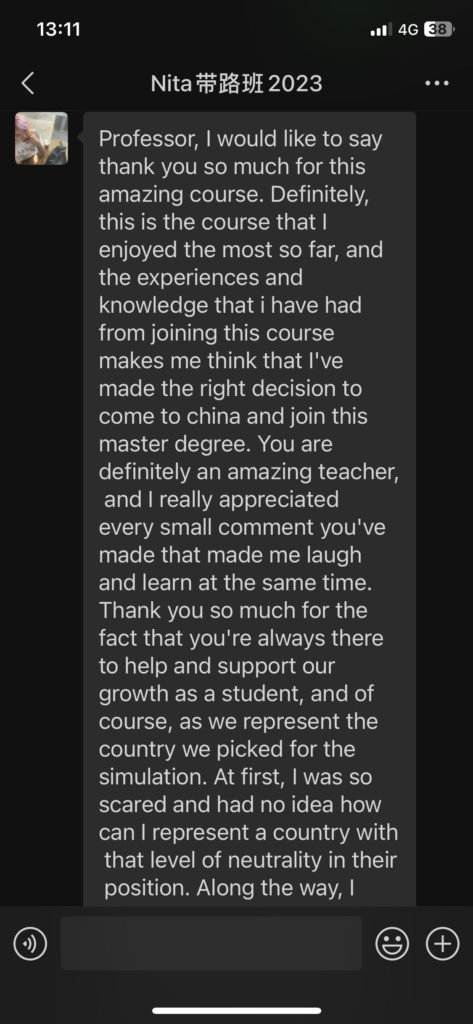
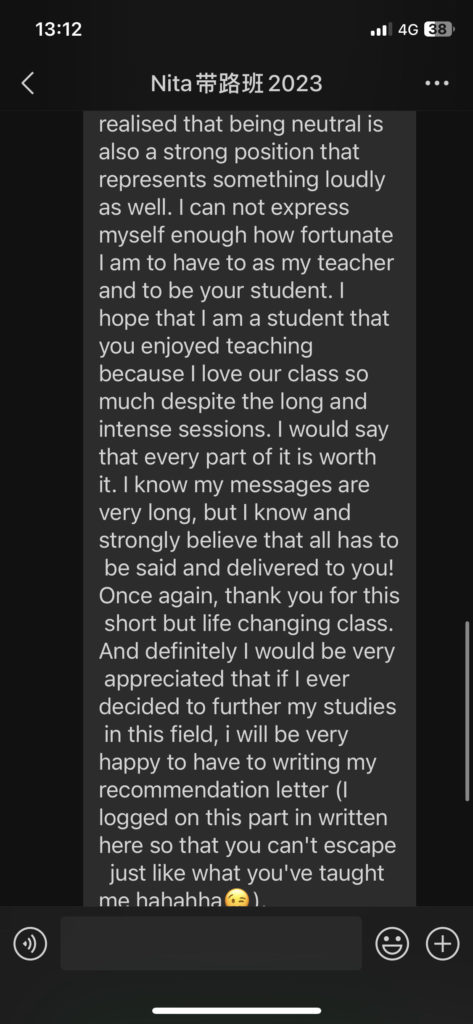
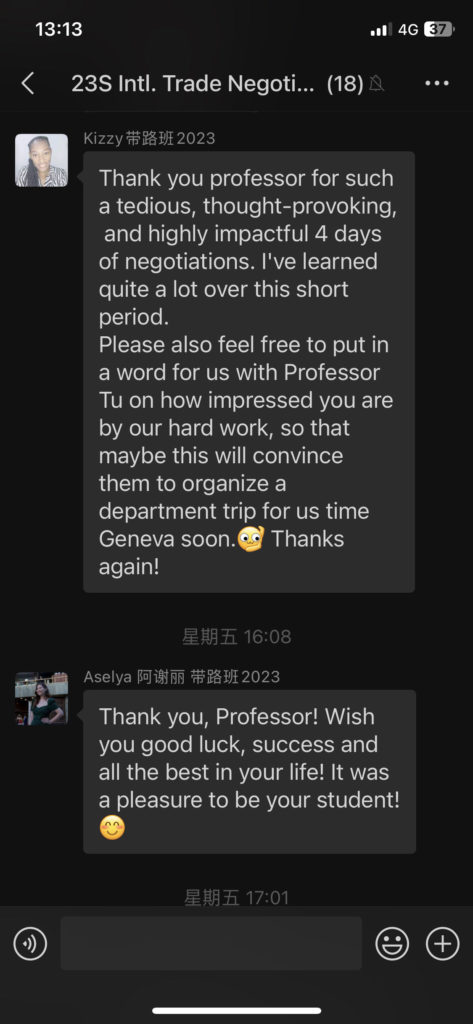
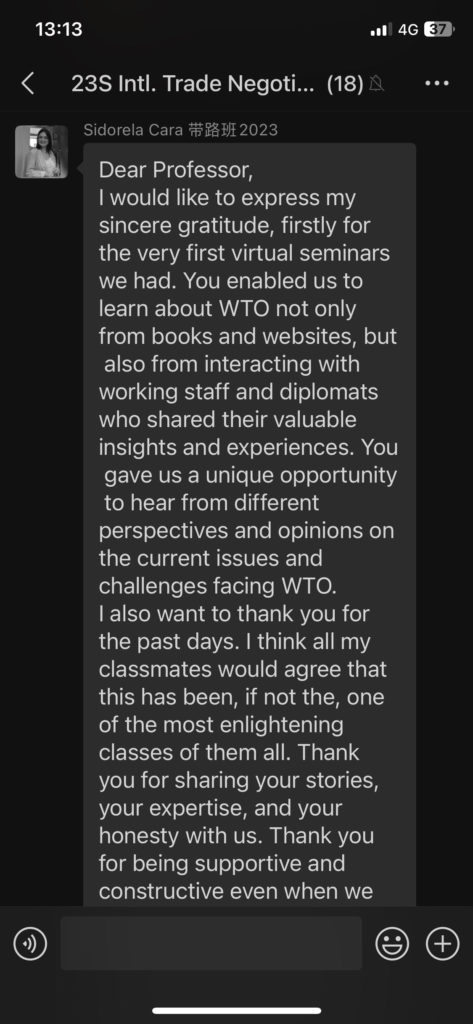
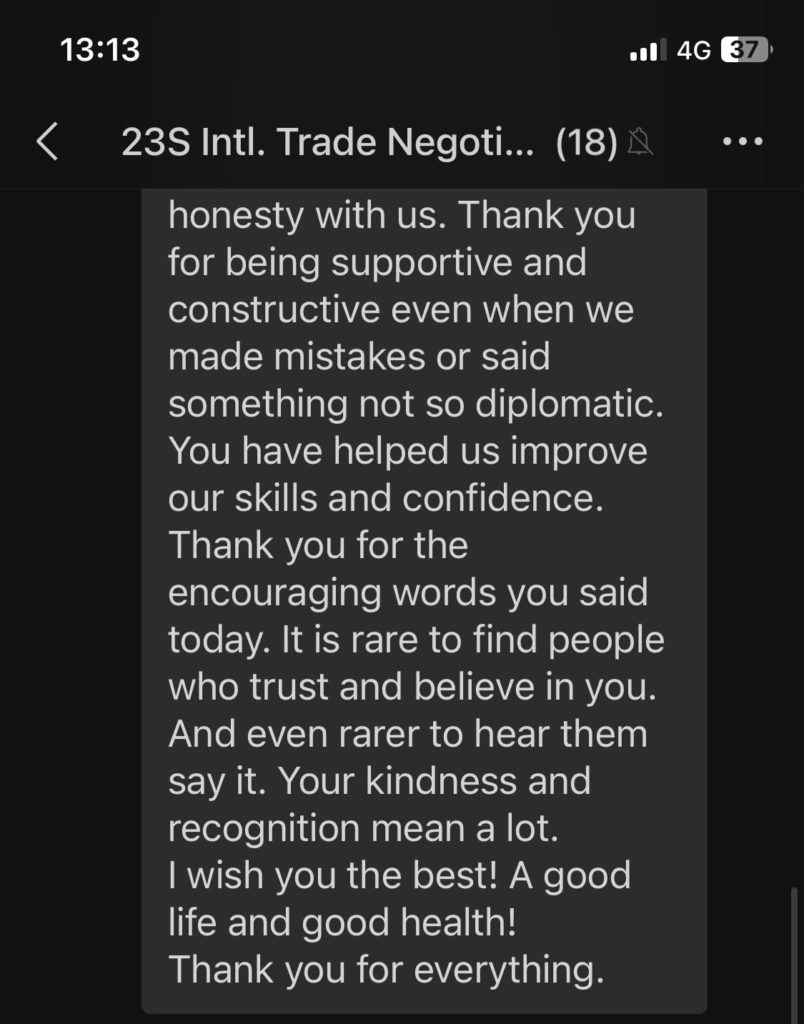
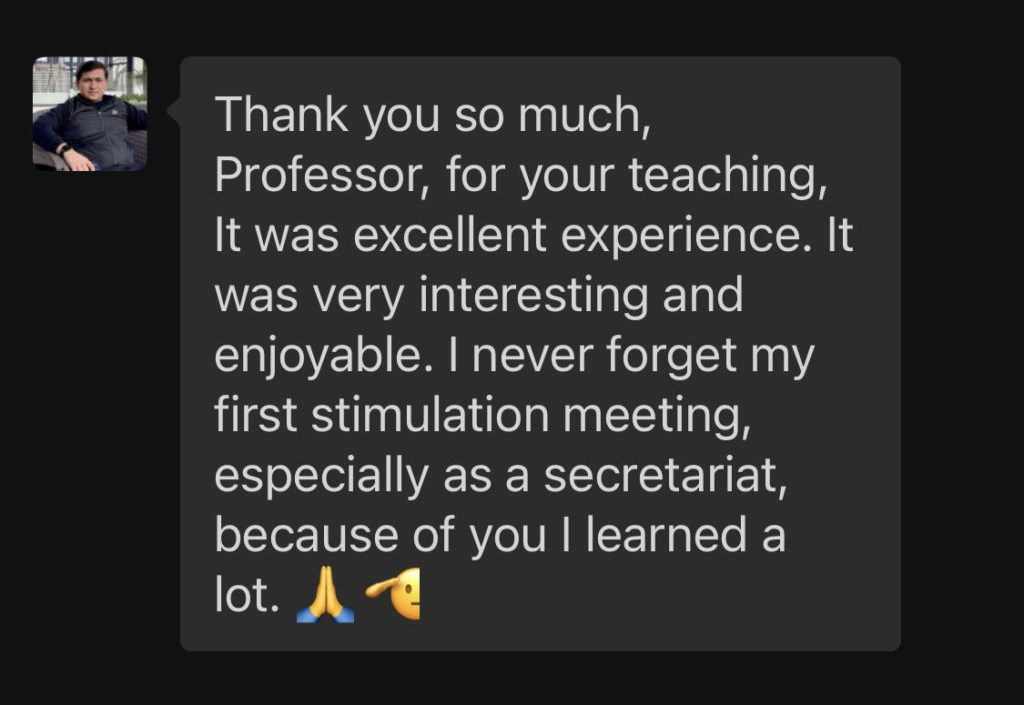

近期评论